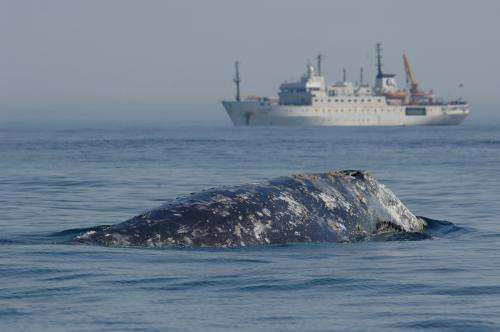Conservationists, big oil join forces to help whales

Conservationists have joined forces with a company working on one of the world's largest oil and gas projects to help limit the impact of seismic surveys on endangered whales.
A group working to save the critically endangered western grey whales said Monday that it and the Sakhalin Energy Investment Company had drawn up stringent guidelines for carrying out surveys of the ocean floor in a way that would cause the least damage to the sound-sensitive mammals.
"This has managed to mitigate many of the potential damages," said Carl Gustaf Lundin, head of the Global Marine and Polar Programme at the Swiss-based International Union for Conservation of Nature (IUCN).
"The number of whales has actually increased" since the project began a decade ago, he told AFP, noting that the population of the endangered sea mammals is now believed to be between 150 and 180.
Their feeding areas near Sakhalin Island on Russia's far eastern coast, north of Japan, happen to overlap with the enormous Sakhalin-2 oil and gas field. Grey whales on the other side of the Pacific, on the North American coast, are not listed as endangered.
The Sakhalin consortium developing the field, which counts Russia's Gazprom and British-Dutch group Shell among its shareholders, uses seismic surveys to pinpoint the location of oil or gas reserves.
This involves using airguns to shoot powerful bursts of sound into the water to measure the return echo and reveal details about the sea floor and what lies beneath.
For whales, who rely on sound to communicate and navigate across huge distances, the onslaught of noise can be torture.
They can become stressed and suffer behavioural changes that can affect their foraging and nursing, or cause direct physical damage, according to the IUCN.
The conservationist group began working with Sakhalin in 2004 and created its Western Gray Whale Advisory Panel (WGWAP) of scientists who carefully map and follow the mammal's population and advise the company when seismic surveys will do the least damage.
"In the Sakhalin case, that means conducting the survey as early as possible in spring when the ice has melted but most of the whales have not yet arrived," said WGWAP's Greg Donovan, who co-authored a study that was published Monday in the journal Aquatic Mammals.
Since whales "behave in a very dynamic manner", scientists needed to keep tabs on them for years before determining for sure that the new guidelines were having a positive effect, Lundin said.
After failing to find any cases of whales damaged by Sakhalin's surveys and determining that the whale population had increased by about three percent, he said the conservationist group felt secure in declaring the cooperation a "very good model" for other companies to adopt.
Noting that Sakhalin had not spent much more than it would have done otherwise conducting its surveys, Lundin stressed: "It would be embarrassing now for other companies if they have accidents, since there is this methodology that could have avoided that."
"They could jeopardise their whole legitimacy," he said.
More information: Abstract of the paper: www.dropbox.com/s/z8jmnab3cdslskb/AM%20Abstract%20&%20Figure%20-%20for%20the%20media.pdf
IUCN brochure, "Marine Seismic Surveys: Modern Approaches to Minimizing Risks in Environmentally Sensitive Areas - Sakhalin Case Study": iucn.org/wgwap/publications_and_reports/list/
Detailed WGWAP reports, whale monitoring and mitigation plans and other documents: www.iucn.org/wgwap
© 2014 AFP
















